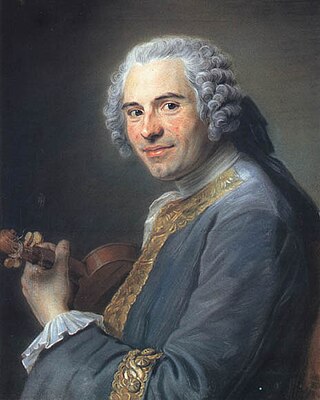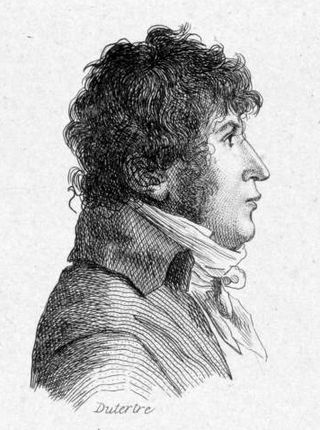Philippe Huttenlocher is a Swiss baritone.

Le Poème Harmonique is a musical ensemble founded in 1998 by Vincent Dumestre to recreate and promote early music, in particular that of the 17th century. Using rare instruments such as the theorbo, the lirone, the tiorbino and the arpa tripla, Le Poème Harmonique aims to recapture the poetry of early music, particularly of the late renaissance and early baroque era. The early 17th-century French and Italian madrigal is a special interest. Le Poème Harmonique also teaches singers in collaboration with the Centre de Musique Baroque at Versailles. The group's recordings with the French Alpha record label of Jean-Paul Combet contributed to the critical and commercial establishment of the label, and included the 1st and 100th releases of the label's primary 'Ut Pictura Musica' series.

Véronique Gens is a French operatic soprano. She has spent much of her career recording and performing Baroque music.
Noémi Rime is a French soprano. She regularly appears in opera productions by William Christie's Les Arts Florissants ensemble. Her roles have included Cleone in Médée, Dido in Dido and Aeneas, and Fatime in Les Indes galantes. She currently teaches on the faculty of the Conservatoire à rayonnement régional de Poitiers.

Jean-Joseph de Mondonville, also known as Jean-Joseph Cassanéa de Mondonville, was a French violinist and composer. He was a younger contemporary of Jean-Philippe Rameau and enjoyed great success in his day. Pierre-Louis Daquin claimed, "If I couldn't be Rameau, there's no one I would rather be than Mondonville".

Les Arts Florissants is a Baroque musical ensemble in residence at the Théâtre de Caen in Caen, France. The organization was founded by conductor William Christie in 1979. The ensemble derives its name from the 1685 opera Les Arts florissants by Marc-Antoine Charpentier. The organization consists of a chamber orchestra of period instruments and a small vocal ensemble. Current notable members include soprano Danielle de Niese and tenor Paul Agnew, who has served as assistant conductor since 2007. Jonathan Cohen is also on the conducting staff; Christie remains the organization's Artistic Director.

Amel Brahim-Djelloul is a soprano opera singer and concert recitalist. She is Algerian with Berber origins.

Henri-Joseph Rigel was a German-born composer of the Classical era who spent most of his working life in France. He was born in Wertheim am Main where his father was musical intendant to the local prince. After an education in Germany, where his teachers included Niccolò Jommelli, Rigel moved to Paris in 1767. He quickly acquired a reputation in musical circles and published harpsichord pieces, string quartets, symphonies and concertos. He began composing for the Concert Spirituel, most notably four hiérodrames : La sortie d'Egypte (1774), La destruction de Jericho (1778), Jephté (1783) and Les Macchabées. These show the influence of Christoph Willibald Gluck, and Gluck himself praised La sortie d'Égypte. Between 1778 and 1799 Rigel also wrote 14 operas, including the opéra comiqueLe savetier et le financier (1778).
Agnès Mellon is a French soprano who specializes in baroque music.
Peter Kooij is a Dutch bass singer who specializes in baroque music.
The chapelle royale was the musical establishment attached to the royal chapel of the French kings. The term may also be applied to the chapel buildings, the Chapelle royale de Versailles.
Henry Madin was a French composer at the Chapelle royale and music theorist.
Le Concert Spirituel is a French ensemble specialising in works of baroque music, played on period instruments. Founded by Hervé Niquet in 1987, it is named after the 18th-century concert series Concert Spirituel. The group performs internationally, playing mostly rarely performed sacred music and operas, and making recordings. Its focus is on French music played at the court of Versailles.
Henri Ledroit was a French counter-tenor, the first in France of the modern revival in that voice range. Originally training to be a baritone in 1972 he met Alfred Deller and decided to train as a countertenor. He made many of the earliest recordings of pieces later to become standards of baroque countertenor repertoire - for example his Orphée Descendant aux Enfers H 471 of Marc-Antoine Charpentier.
Sébastien Daucé is a French conductor, born in Rennes (France) on 4 June 1980. He is artistic director and founder of Ensemble Correspondances, formed from alumni of the Conservatoire National Supérieur de Musique de Lyon.
Philippe Cantor is a contemporary French bass-baritone.
Jean-François Novelli is a contemporary French tenor born in Fontainebleau.

Bruno Boterf is a contemporary French tenor, specialising in Baroque and early music.

Claire Lefilliâtre is a contemporary French soprano specialising in Baroque music repertoire.
Bernard Deletré is a French operatic bass-baritone.







